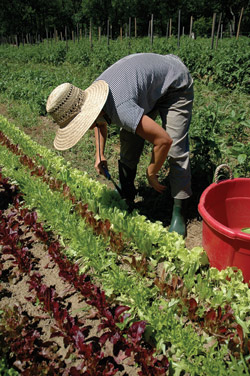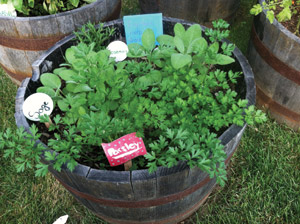This month, FE&S examines two Northeastern hospitals with foodservice programs managed by Unidine Corp., which continues to take steps toward enhancing sustainability programs at these and other healthcare facilities.
Full Circle Sustainability at New Milford Hospital New Milford, Conn.
 By creating ready-to-use compost for use in the on-site garden or to sell to local farm partners, New Milford Hospital prides itself on being able to complete the circle of sustainability.
By creating ready-to-use compost for use in the on-site garden or to sell to local farm partners, New Milford Hospital prides itself on being able to complete the circle of sustainability.
Purchasing a pulper-dehydrator unit helped the hospital reduce its daily food waste by 250 to 300 pounds, according to Kerry Gold, New Milford's executive chef. After reducing its waste by 90 percent, the hospital has roughly 30 pounds of compost-ready material it can use in its own gardens or sell to local farmers who provide the foodservice operation with sustainable produce. In fact, the farms can literally swap their boxes of fresh-picked food for free compost right at the loading dock.
In February, Gold helped start the hospital's Feeding the Farm program, bringing buckets of food scraps from the kitchen to Winding Brook Farm — a working farm at which autistic children feed the scraps to the animals. Since the program's inception, the hospital has supplied 2,187 pounds of melon rinds, pineapple cores and other fruit and vegetable trimmings. Each week a representative from the farm picks up about 100 pounds of food scraps from the kitchen's walk-in cooler.
New Milford also strives to help cut down on carbon emissions by sourcing most of its fruits, vegetables — and even proteins — from nearby sources. "We partner with seven local farms to purchase 80 percent of our produce from within 15 miles," says Gold.
The farmers email Gold a weekly product list, and to be fair to everyone, he'll buy the bulk of his beets, kale, tomatoes and other staples from different vendors rather than buy everything from one source. This, and swapping some meat purchases for quinoa and other nonmeat proteins, helps him seek out the best prices based on his high-volume needs.
John Turenne, FCSI, founder and president of Sustainable Food Systems and a former chef at Yale University, who started the sustainable foodservice program there, consulted on the New Milford project, helping the hospital evaluate and develop a strategy to improve the dietary department and make it more sustainable. It was Turenne who ultimately connected New Milford with Unidine Corp., a from-scratch, sustainability-focused foodservice management contractor, but he says Gold has been the "main man who has taken on the challenge and gone the extra mile to make the program a reality."
"In today's world of big healthcare and big food, it's reassuring to still see a hospital whose mission is truly focused on the positive and proactive impact food has on health and well-being," Turenne says. "New Milford Hospital's foodservice still stands as an example for all to see — that great foodservice in healthcare can be done. They have shown a true commitment to people, planet and community."
Back in 2009, when Unidine was contracted to help boost the food's freshness and health benefits, the hospital built a garden outside the back of the main kitchen. When New Milford builds a new emergency room, Gold's garden will expand from 3,000 square feet to 11,000 square feet on the new building's green roof.
It's a selling point for the foodservice operation as well as a morale booster for staff, patients and visitors. Gold hopes to invite Girl Scout troops and other bands of young volunteers to help with the planting and harvesting, and continue the hospital's tradition of healthy eating education.
"We want our staff, our guests and our patients to know our farms," says Gold. "With in-room dining programs we create a packet that showcases the farms as well as healthy eating tips." The hospital recently secured grants from the state's department of agriculture for an expanded marketing budget that included more tray signs and table tents introducing the farms and local food. It's communication like that that also helps the hospital remain competitive with nearby restaurants and lunch destinations.
Even the mayor comes to New Milford to dine because of the farm-fresh quality of the food and sustainability mission. "We try to forge a stronger connection with the community through what we do here," says Gold.
State Collaboration for Sustainability at Lahey Health, Gloucester, Lynn and Beverly, Mass.
 The Addison Gilbert Hospital employee herb garden includes parsley, sage and rosemary.Lahey Health proves the practice of providing healthier, fresher menu options can also be sustainable. The hospital partners with the state on various healthy eating and sustainable initiatives.
The Addison Gilbert Hospital employee herb garden includes parsley, sage and rosemary.Lahey Health proves the practice of providing healthier, fresher menu options can also be sustainable. The hospital partners with the state on various healthy eating and sustainable initiatives.
"We partner with the hospital and other state organizations to try to be good stewards of the environment," says Lynn Larsen, RD, LDN, clinical nutrition manager at Unidine Corp., who sits on Lahey's Healthy Hospital Committee, which includes a variety of hospital staff members and oversees such initiatives.
The Lahey network consists of three hospitals managed by Unidine that focus on sustainable, healthy initiatives: Addison Gilbert in Gloucester, Mass. (58 beds, serving 120 patients and 300 café meals per day); BayRidge in Lynn, Mass. (62 beds, serving 216 patients and 60 café meals per day), and Beverly in Beverly, Mass. (221 beds, serving 540 inpatients and 700 retail meals per day), where Larsen spends much of her time.
As part of the Health Care Without Harm initiative in Massachusetts, Lahey Health and Unidine Corp. strive to purchase more local food — nothing comes from more than 200 miles away. With Addison Gilbert located in one of the oldest fishing communities in the country, it's easy to source fresh seafood from just 15 minutes down the road.
Larsen also worked with her contacts at Health Care Without Harm to source compostable containers to fit the needs of the Beverly Hospital kitchen and its sustainability mission. The Lahey Hospital network has also conducted healthy eating demos in the kitchens, has coordinated farm tours, and completed an audit with Harvard University to examine and improve its sustainability and green efforts throughout the multiple facilities.
After Boston made a move to eliminate, or at least cut down, the sale of sugar-sweetened beverages at foodservice and retail outlets statewide, Lahey Health removed all bottled soda from its cafeterias to offer healthier options and cut down on the excess use and production of plastics. Even the vending machines have been overhauled.
"A hospital ethically should not be making money off of making people sick," says Larsen. Vending machines now offer trail mixes, nuts, sugar-free energy bars and other "whole" foods rather than candy, chips or processed snacks.
Various "hydrate for health" stations throughout the hospitals offer filtered and infused water steeped with basil, rosemary and mint as well as other calorie-free beverages. The herbs are grown in the on-site gardens at various Lahey Health's facilities.
At BayRidge, some patients even get involved in the planting, weeding, watering and harvesting — it's therapeutic for them and offers extra, much-needed helping hands. The gardens are also opened up to the staff, who can pick produce to take home.
Unidine Corp. remains committed to scratch cooking meals and banning the purchase of canned food, Larsen says. Batch cooking in smaller amounts helps cut down on waste while preserving the freshness of the food. Kitchen staff also blanch and par-cook many fruits and vegetables they buy
locally with short shelf lives. And regular fresh food deliveries — up to three days a week — cut down on waste.
Many Lahey Health facilities compost as well. "We used to flush everything down the garbage disposal, which just used extra water," Larsen says of the Beverly location. "Now we transport food waste from the café to large garbage pails that are picked up by a composting hauler three days a week." Cooks in the kitchen also keep compost buckets nearby for food scraps as well. Lahey Health uses single-stream recycling, which allows diners to throw paper in with cans and bottles so they don't get confused and make mistakes. Leftovers can be easily wrapped up to go at wrapping stations to cut back on the waste of to-go containers.
The hospital network also recycles cooking oil from the few fryers they have retained on-site, which generates revenue, says Larsen.
"We look at our initiatives as one big campus even if we have facilities in three different cities," says Larsen. This helps streamline decision making about sustainable initiatives and consolidate budgets so Lahey can venture down this environmentally friendly, healthy eating path.



